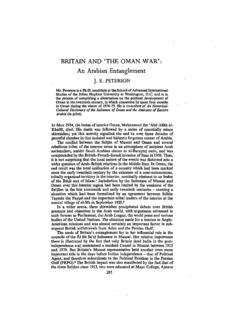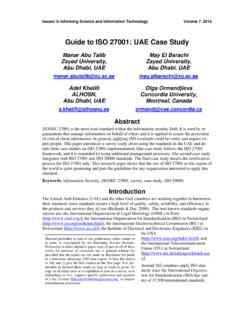Transcription of The Historical British Role in the Gulf - J. E. Peterson
1 207 National Center for Documentation & Research abu dhabi UAE 23-25 November 2008 The modern state of abu dhabi owes much to the policies and actions carried out by Shaikh Zayid bin Khalifah, the ruler of abu dhabi during the last half of the 19th and the first few years of the 20th centuries. He was obliged to move carefully through a myriad of competing forces in the region and to tread lightly when dealing with the two imperial powers intimately involved in Gulf affairs at the time, that is the Ottomans and Britain. It was Britain of course that came to dominate the Gulf until well into the 20th century and so it can be said that Zayid s most important relations in many respects were with Britain.
2 Whatever his move, Zayid had to consider what the British reaction would be and adjust accordingly. Over the course of his reign, his relationship with Britain moved from a pas de deux over his relations with the Ottomans to formal protected status. While this may have forced him to move cautiously, it did not prevent the consolidation of his and Al Nahyan authority over the edifice of modern Abu Historical British Role in the GulfBritish dominion over India was responsible for its long interest in and dominance over the Gulf, the apogee of which occurred in the 19th and first half of the 20th centuries. Because of its interests, the British government of India played an increasing role in the politics of the Arabian littoral of the Gulf.
3 This was displayed in a variety of , Britain took naval action to suppress what it regarded as piracy in the early 19th century. The principal object of such action was the maritime power of al-Qawasim, based at Ra s al-Khaymah in what is now the northern United Arab Emirates (UAE). Several attacks were carried out on the town between 1817 and 1820 when it was , Britain began instituting a system of maritime truces in the early and mid-19th century that forbade warfare by sea, since maritime passage was Britain s principal interest at that time. These truces were temporary in nature until 1853 when a general and perpetual treaty of maritime peace was signed.
4 This system of truces in effect legitimized the littoral Shaikhs who signed them, conferring recognition of their leadership over settlements and allied tribes, their right and the right of their families to be regarded as local rulers, and implying their responsibility for the activities of the populace living under their direct control or in their sphere of British actions against al-Qawasim are detailed in Lorimer, comp., Gazetteer of the Persian Gulf, Om n, and Central Arabia (Calcutta: Superintendent, Government Printing, Vol. 1: 1915; Vol. 2: 1908), Vol. 1, Part 1, pp. 637-670. For rebuttals of the allegations of piracy, see Sultan Muhammad al-Qasimi, The Myth of Arab Piracy in the Gulf (London: Croom Helm, 1986.)
5 2nd ed.; London: Routledge, 1988), and Charles E. Davies, The Blood-Red Flag: An Investigation into Qasimi Piracy, 1797-1820 (Exeter, UK: University of Exeter Press, 1997).2 All agreements and treaties between the British government and littoral rulers can be found in Aitchison, comp., A Collection of Treaties, Engagements and Sanads Relating to India and Neighbouring Countries (revised ed.; Delhi: Manager of Publications, 1933), Vol. 11, Containing The Treaties, &c., Relating to Aden and the South Western Coast of Arabia, the Arab Principalities in the Persian Gulf, Muscat (Oman), Baluchistan and the North-West Frontier Province. Britain and State Formation in the Gulf: The Case of abu dhabi and Shaikh Zayid bin Peterson208 New Perspectives On Recording UAE HistoryThird, this complex of putative recognition was transformed into formal protected status through a number of agreements in or about the 1890s.
6 Not only did these agreements place the local rulers along the Arab littoral under the protection and dominance of British India, which exercised both de jure and de facto rights to interfere in and direct local affairs when it was felt necessary. This period also resulted in the maturation of the British agent system throughout the next step in the intensification of British shaping of statehood on the Arab littoral was prompted by the introduction of air routes to the region in the 1920s and 1930s. Principally, these were the Imperial Airways route from London to India and the Basra-Aden Royal Air Force (RAF) route. The short range of both civil and military aircraft required the establishment of a chain of airfields for regular use and a supplementary network of emergency landing areas.
7 The security of these airfields and landing strips required that the local rulers exercised effective control of their hinterlands. Imposing conditions for rulers control over tribes and populations under their control on land was a significant step up from the earlier concern over rulers control over maritime activities. It should be noted, though, that the introduction of British agents at various settlements along the littoral and concern over Ottoman and Saudi expansionism had led to a stronger measure of British involvement in the littoral rulers internal affairs impact of air routes on British regard for internal security was in turn superseded by British efforts to acquire oil concessions for British companies in the littoral states.
8 Concomitantly with the search for oil, this required an extension of rulers functions from authority over people to territorial integrity and the need to exercise full control of everything within the boundaries of their emerging concern did not disappear with the independence of India in 19 7. For one thing, British oil companies were active participants in many of the producing concessions. This also meant that other British firms capitalized on commercial opportunities in the newly developing Gulf economies. But British actions to protect their clients took the form of efforts to prevent the penetration of radical ideologies in the Gulf during the 1950s and 1960s.
9 Even after Kuwait became independent in 1961, Britain felt it necessary later that year to make a show of political will to engage revolutionary Iraq in military action if Baghdad should move on , the British decision to withdraw from the Gulf, made in 1968 and carried out in 1971, prompted British and international concern over the stability and survival of the small Arab states without the protection of the British umbrella. Needless to say, these states have survived very well, albeit with a broader American umbrella backed by Britain and other effect of these activities and their gradual evolution on the peoples and rulers along the Arab littoral was profound. It was the genesis of a transformation from almost purely tribal systems to prevenient states.
10 Those prominent leadership figures along the Arab littoral that the British encountered were confirmed in their authority and their 3 The agreements are discussed in a number of works, particularly in various country studies. The text of the agreements can be found in Aitchison, Collection of Treaties. Peterson , Defending Arabia (London: Croom Helm; New York: St. Martin s Press, 1986).National Center for Documentation & Research abu dhabi UAE 23-25 November 2008209writ gradually evolved into the status of rulers of small states. Thus the Arab littoral was brought into British India s informal empire and an abiding relationship between the region and Britain is especially important to note that the course of this history was determined not only by British policy but also in substantial part by certain strong local personalities.









